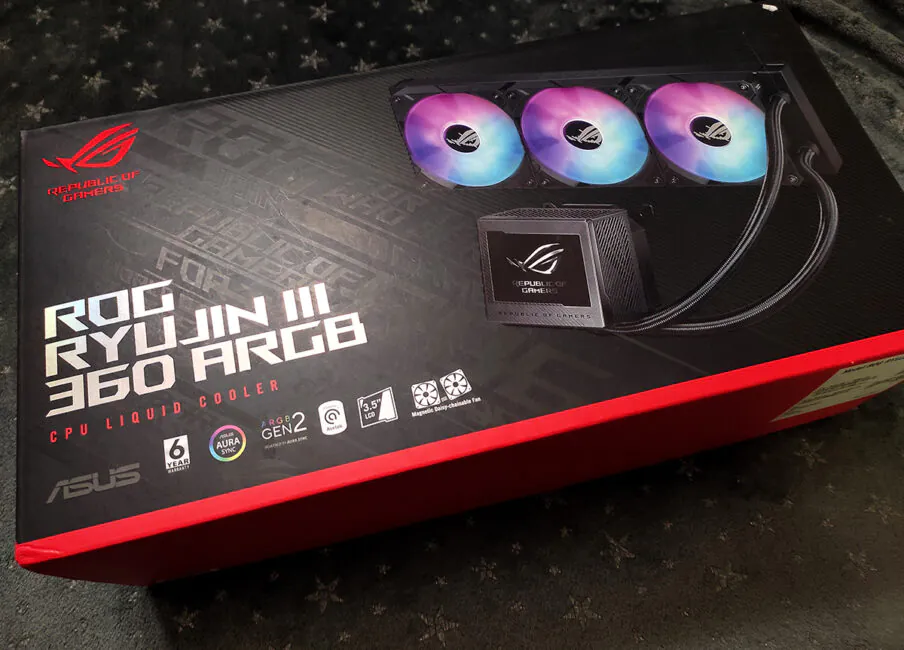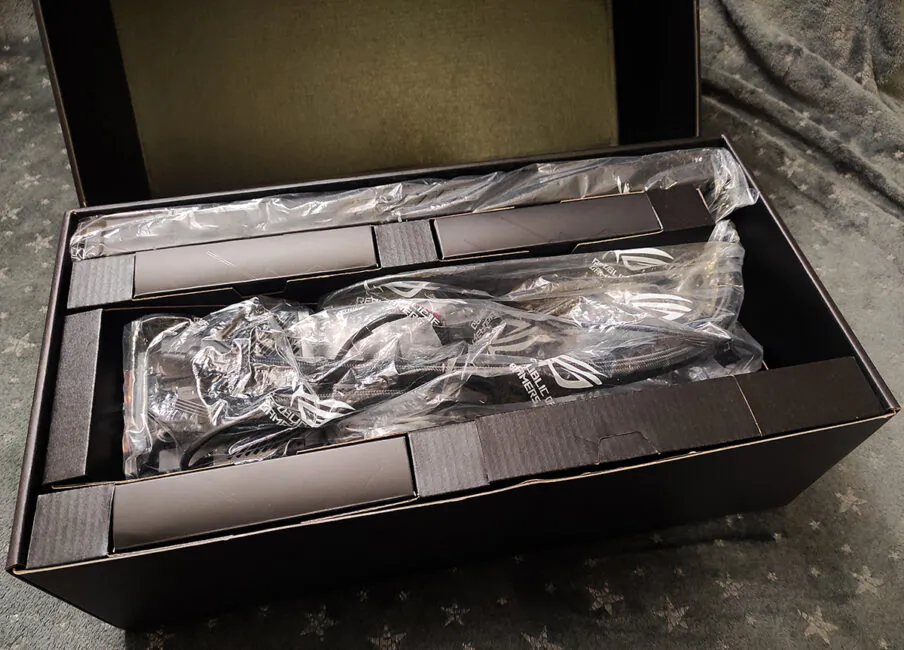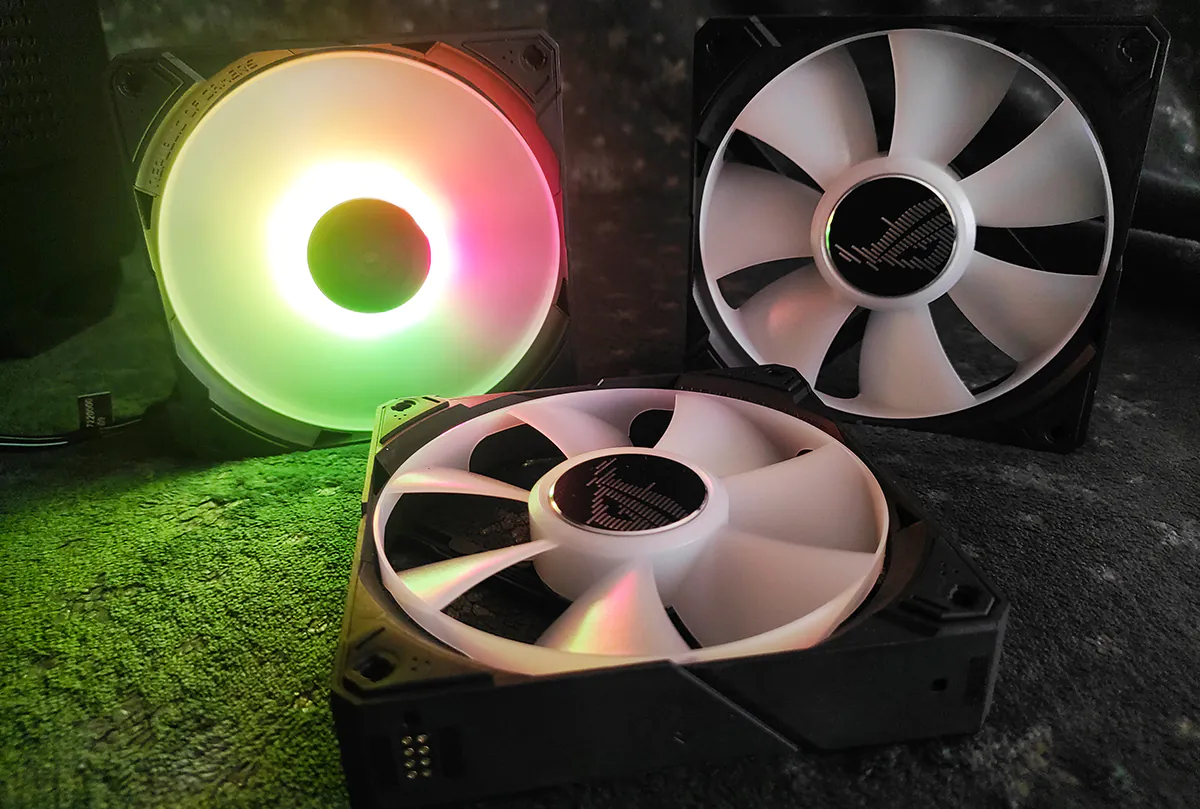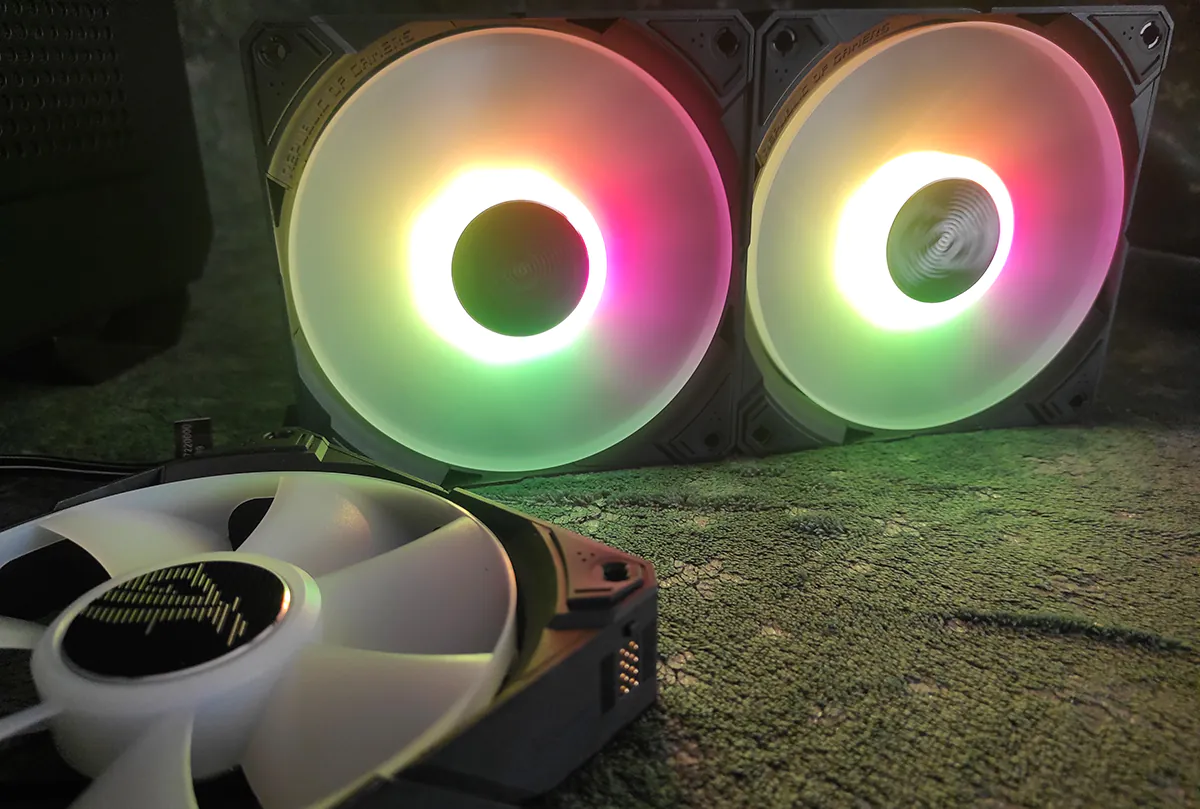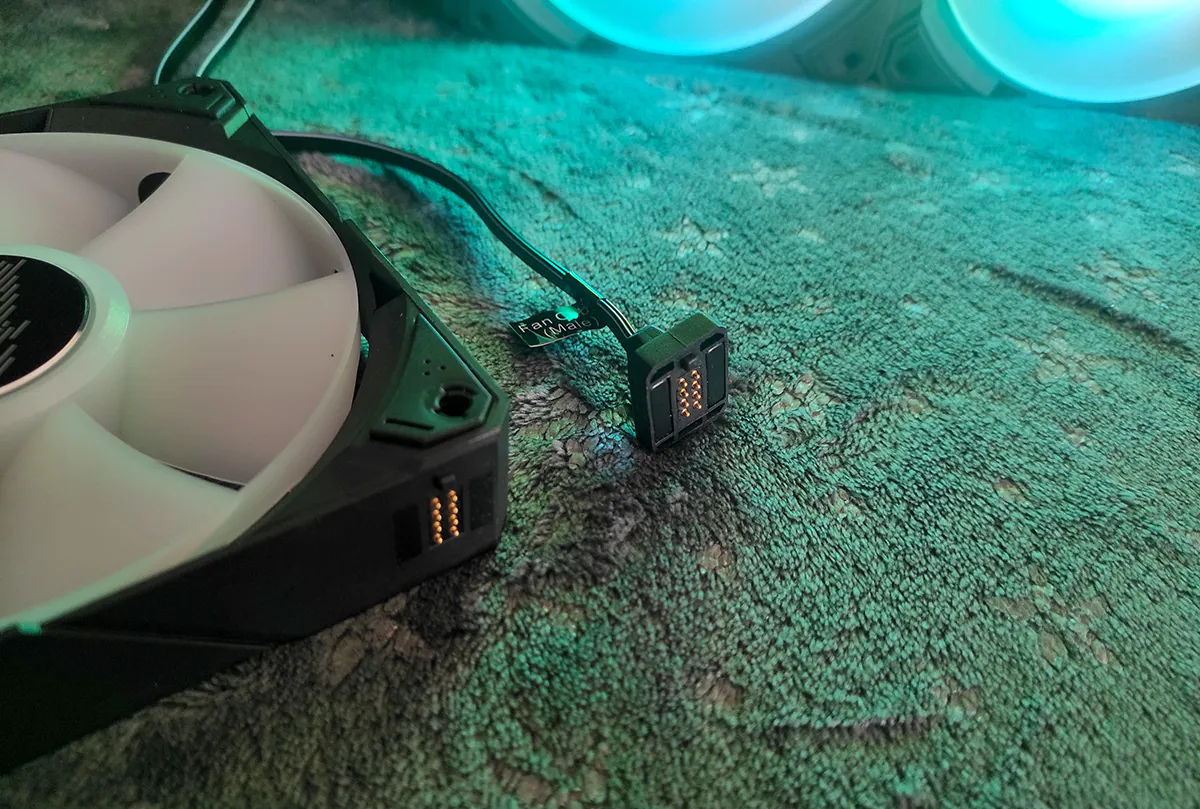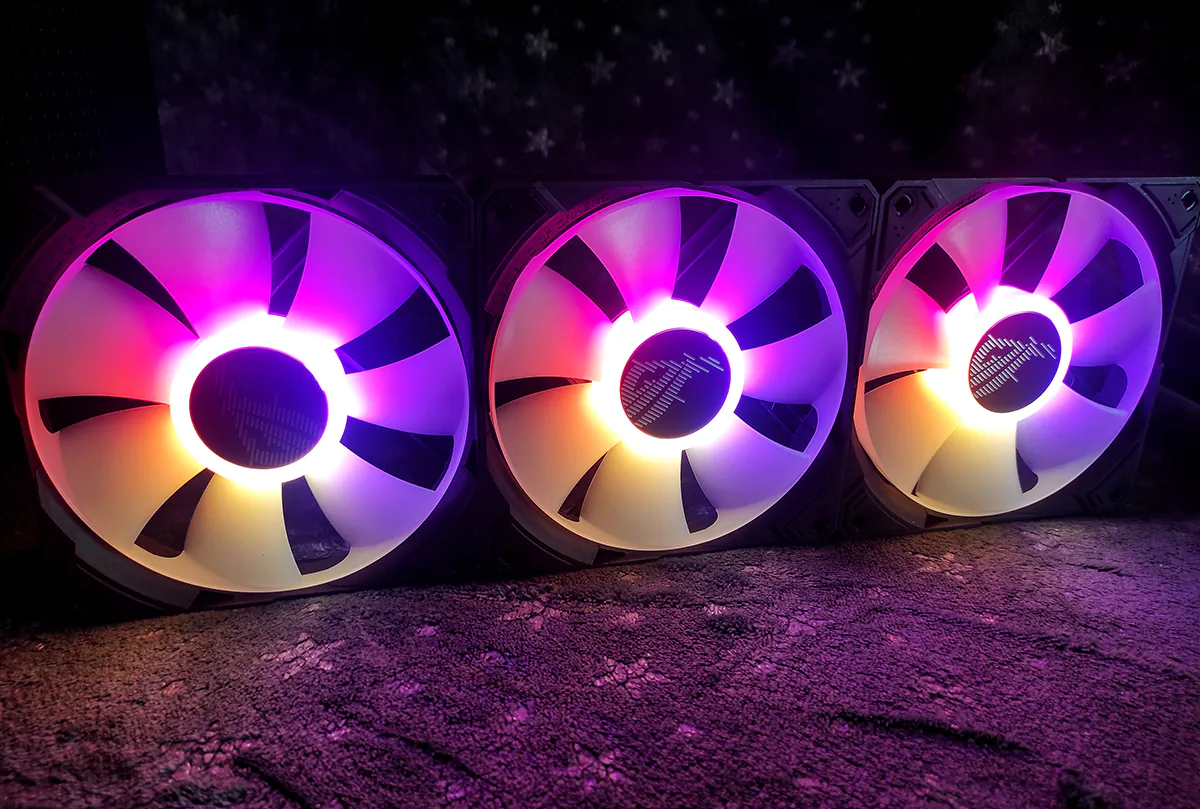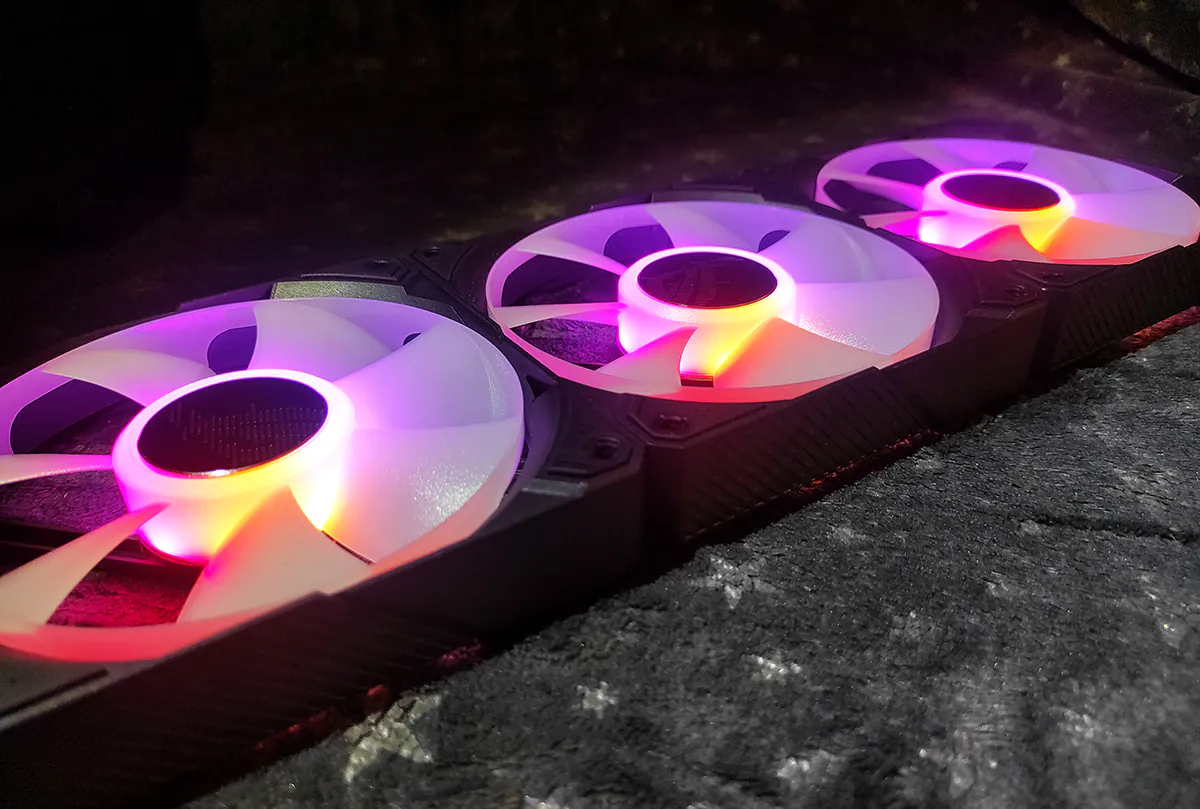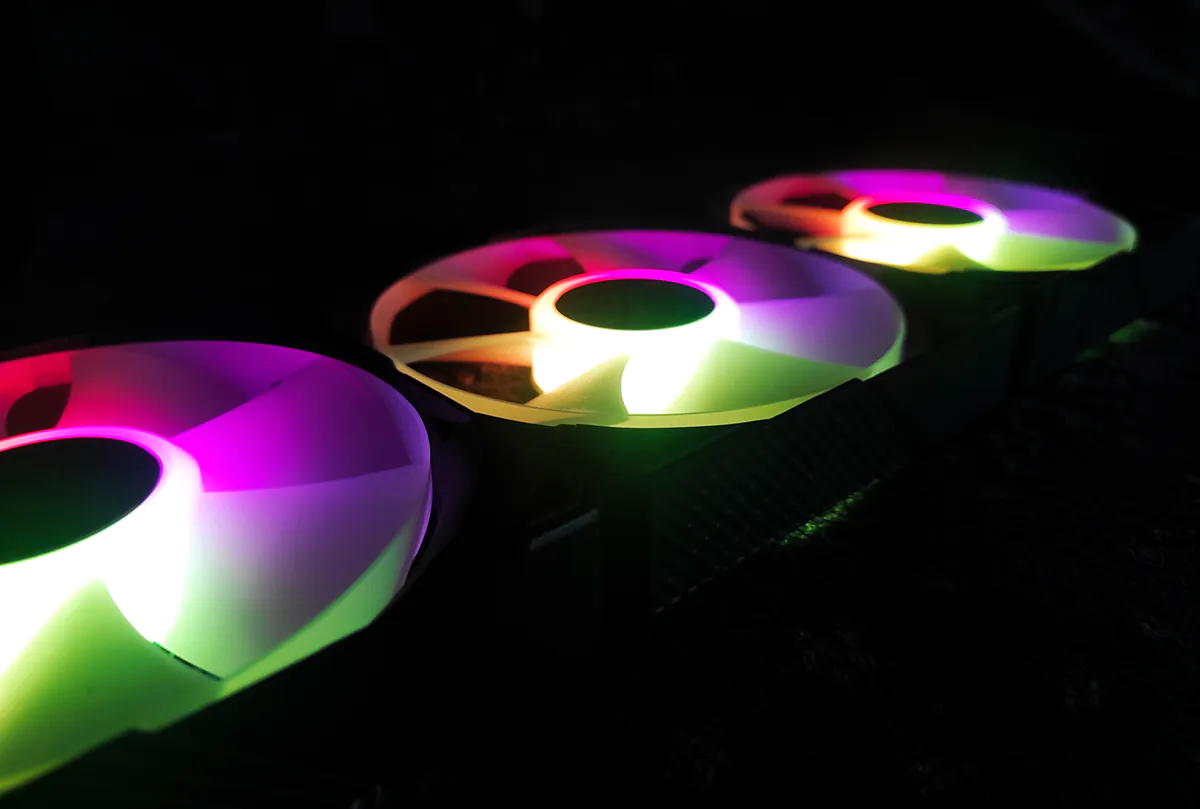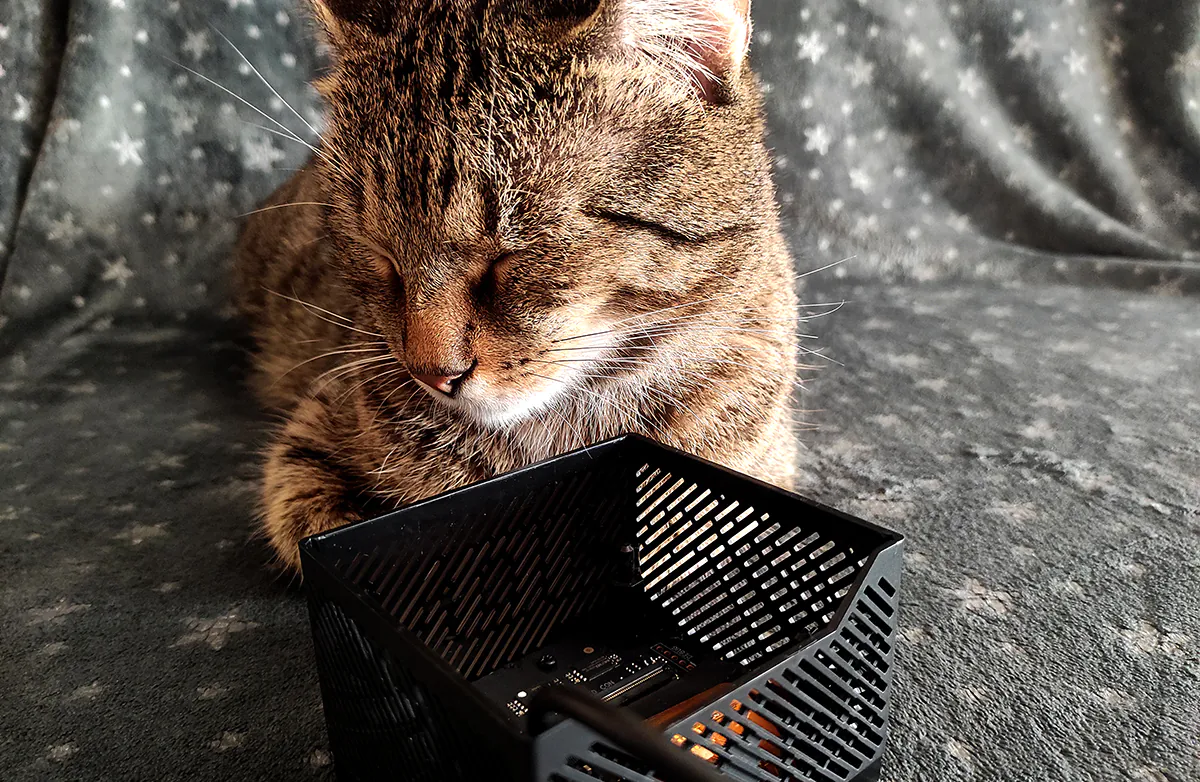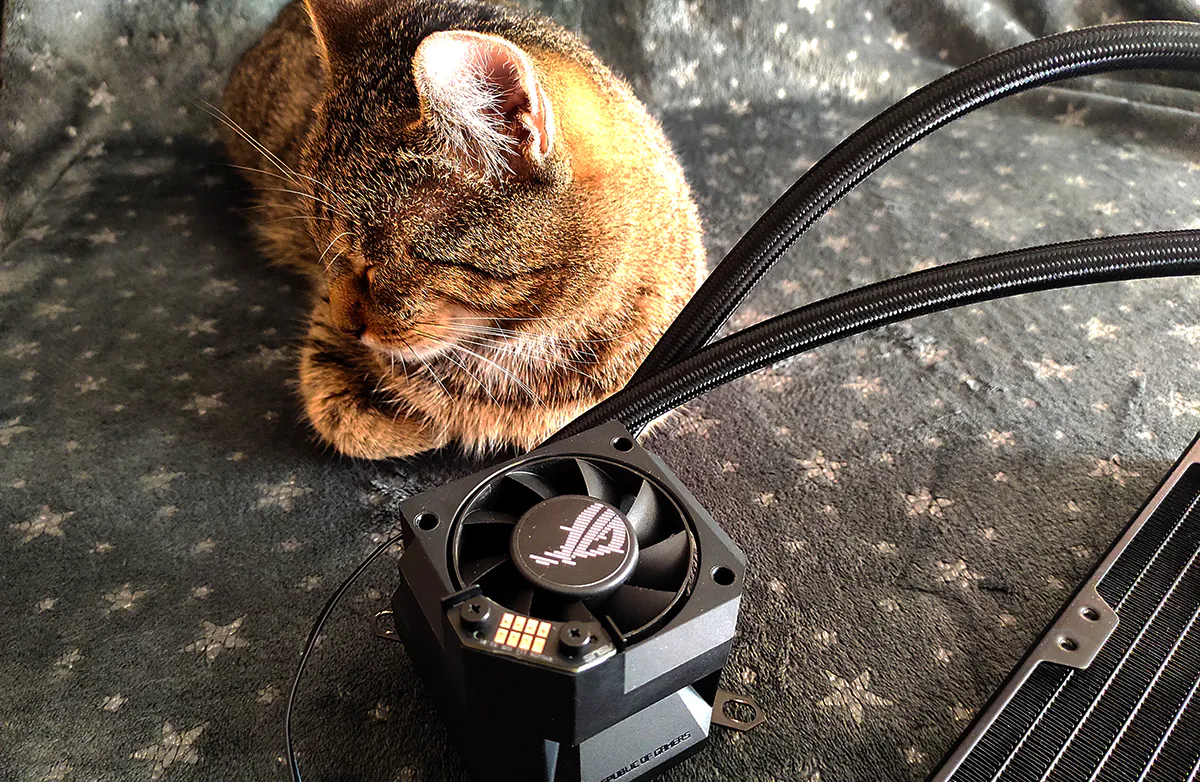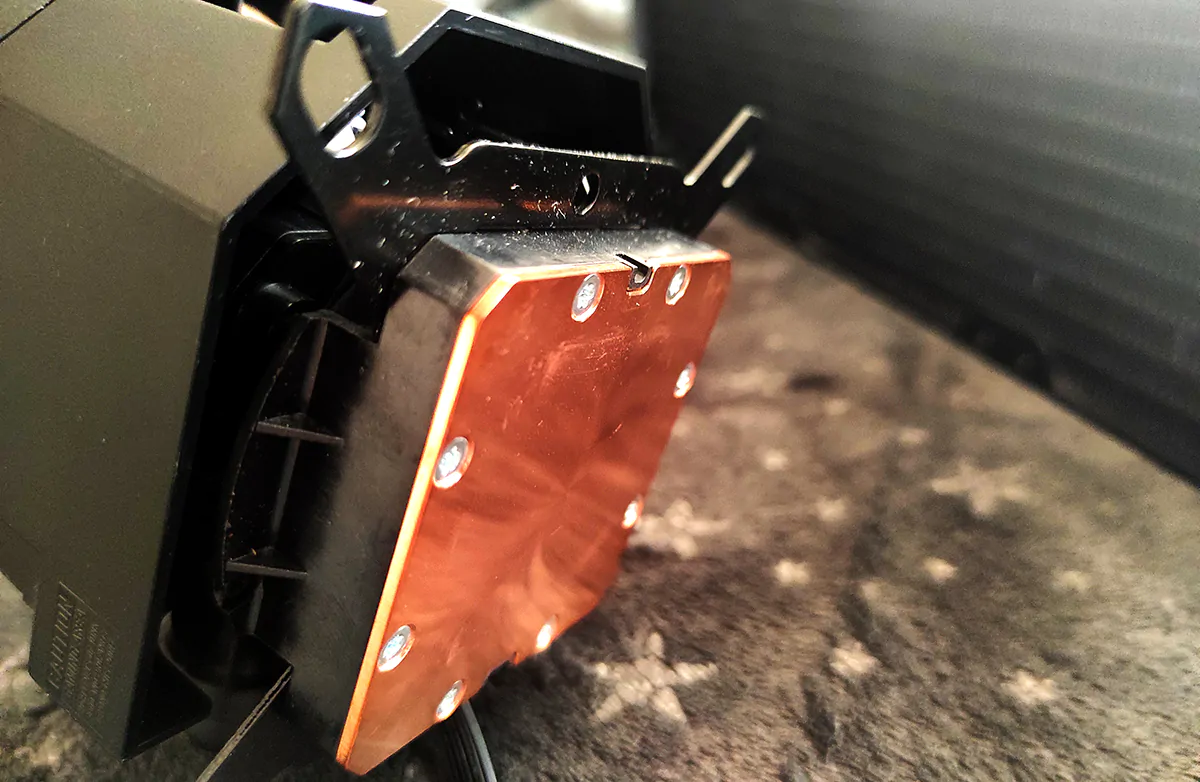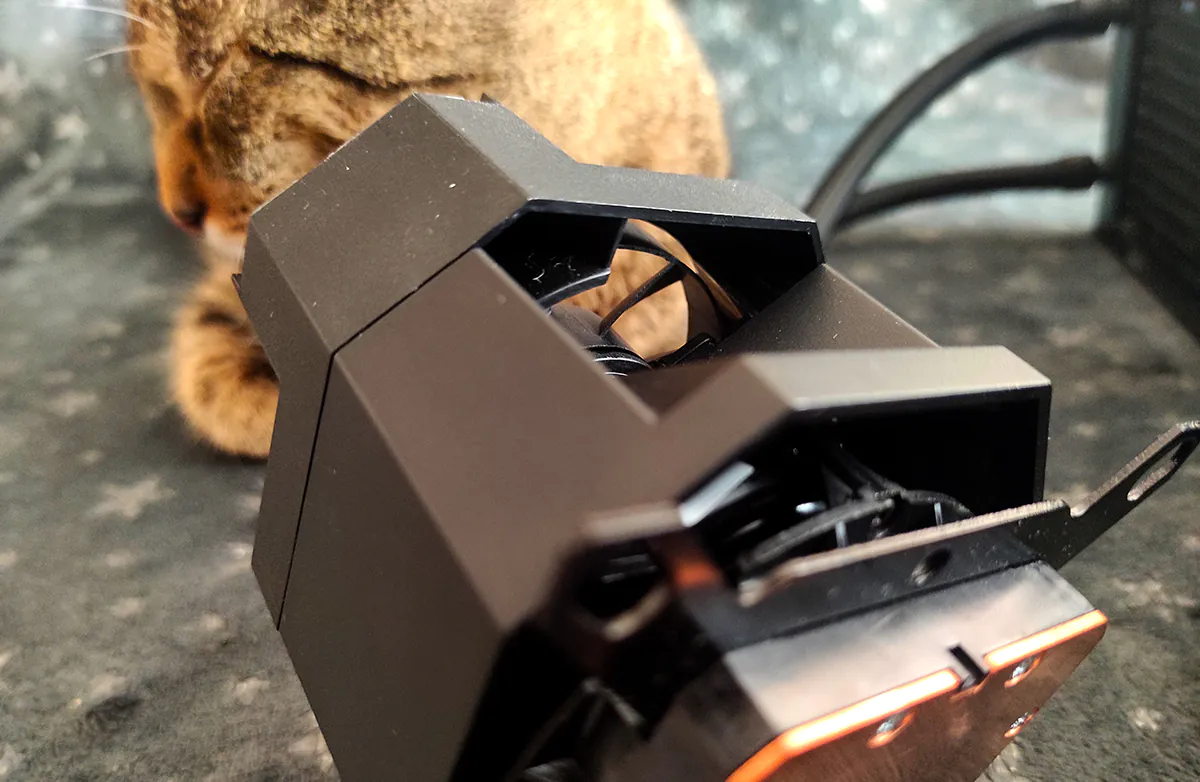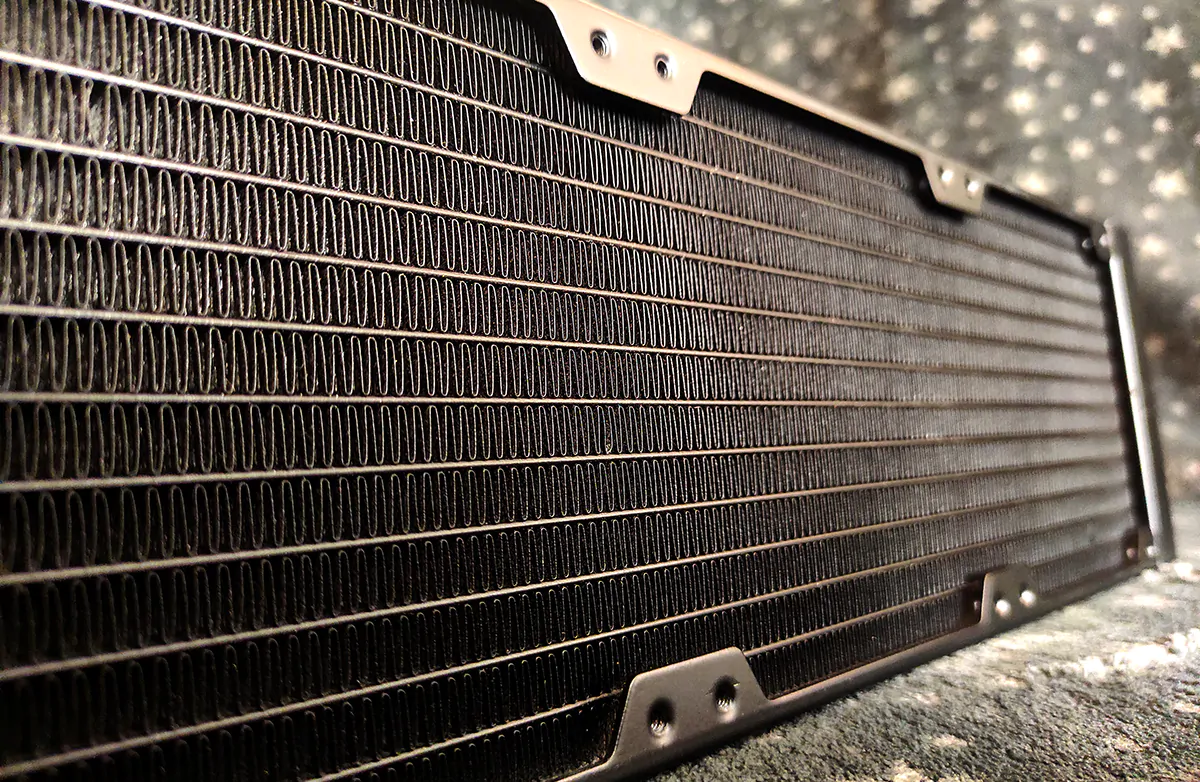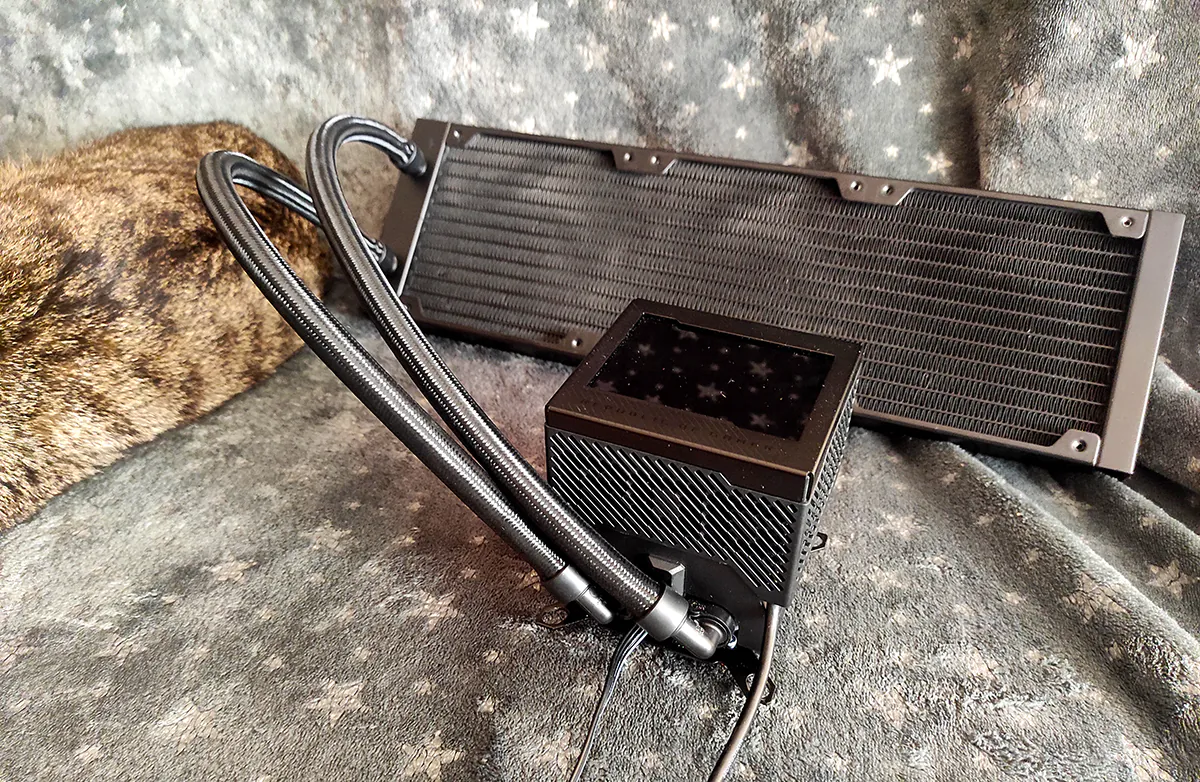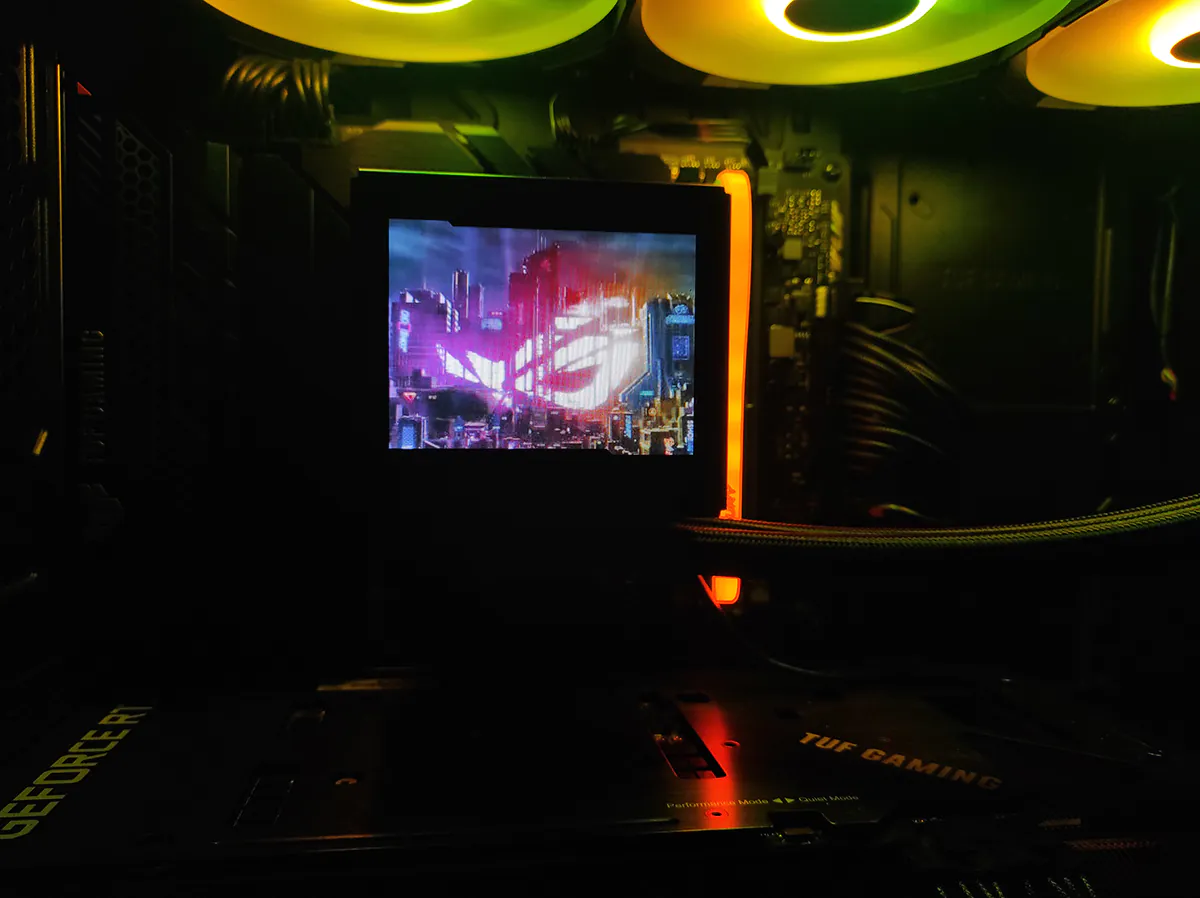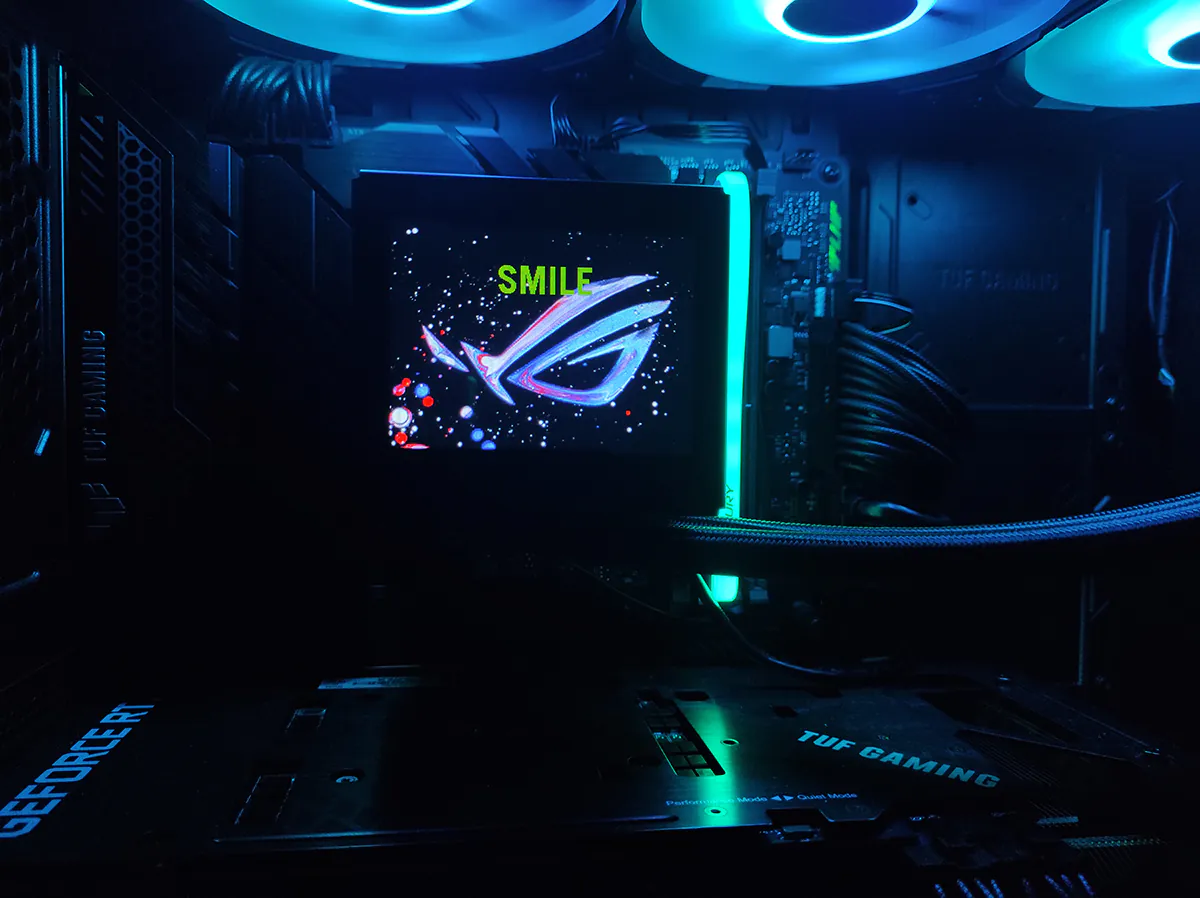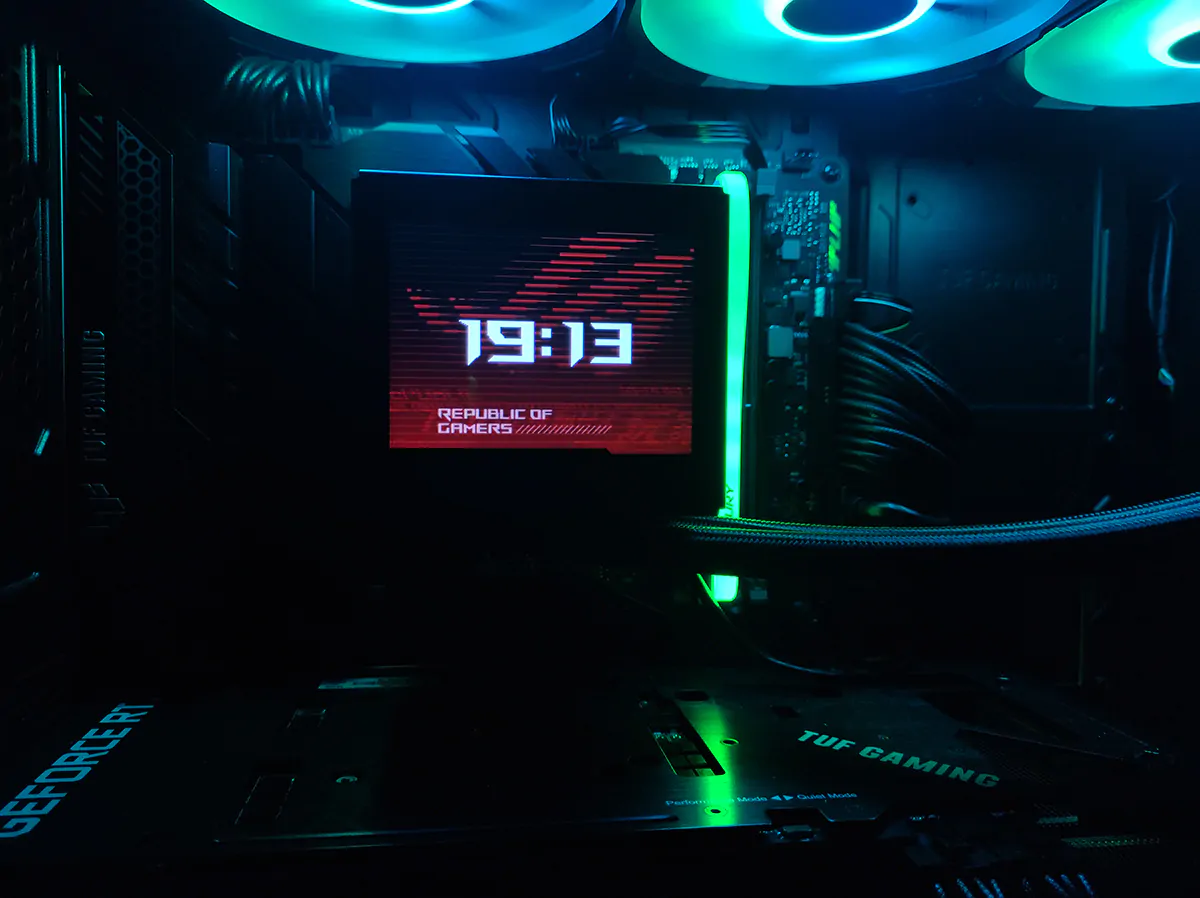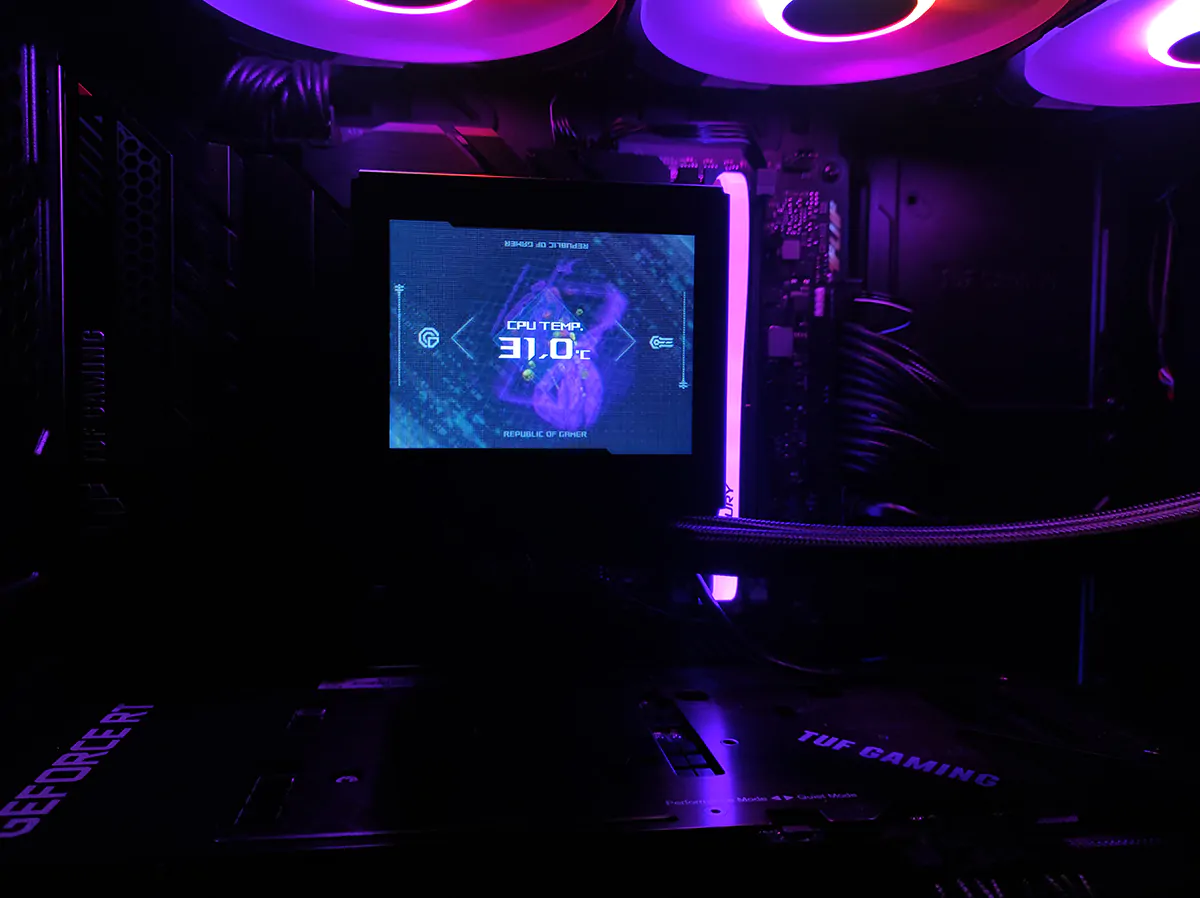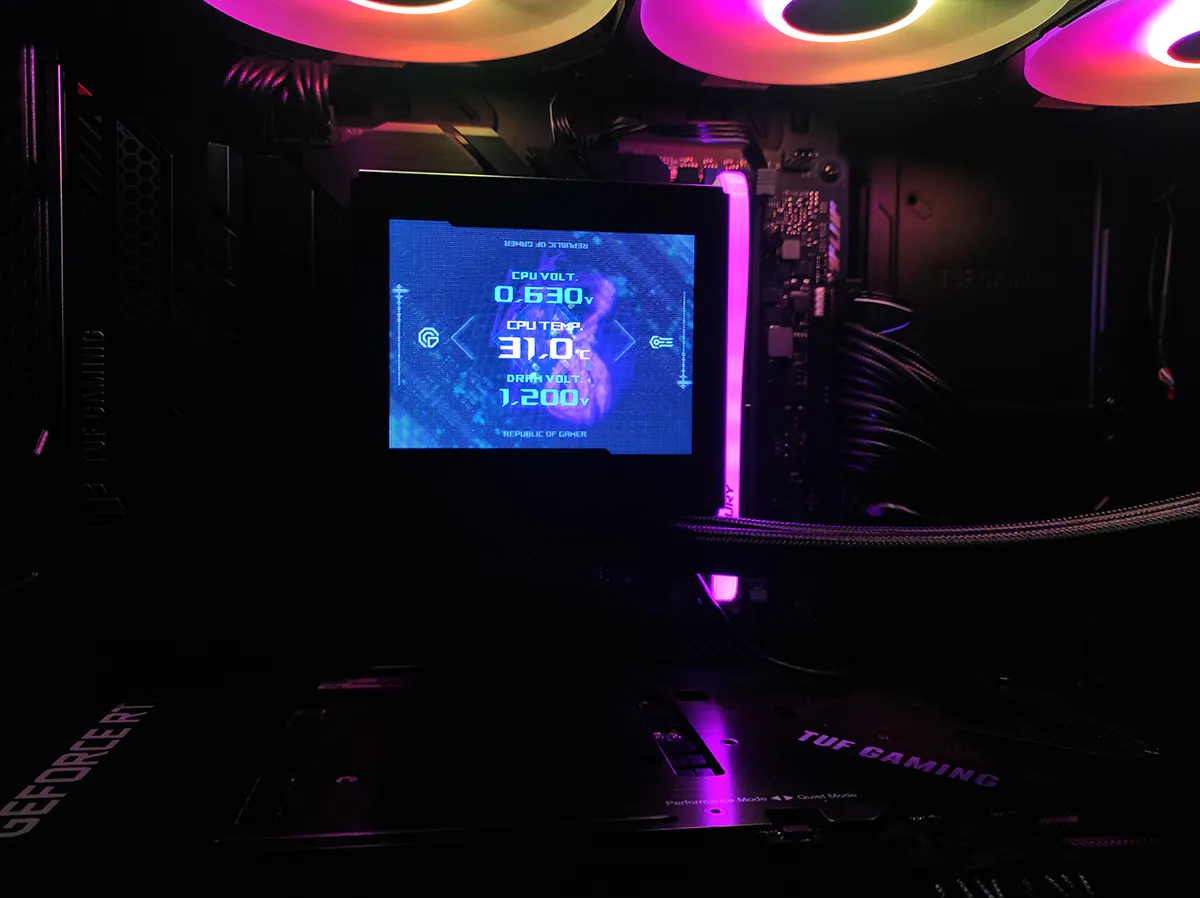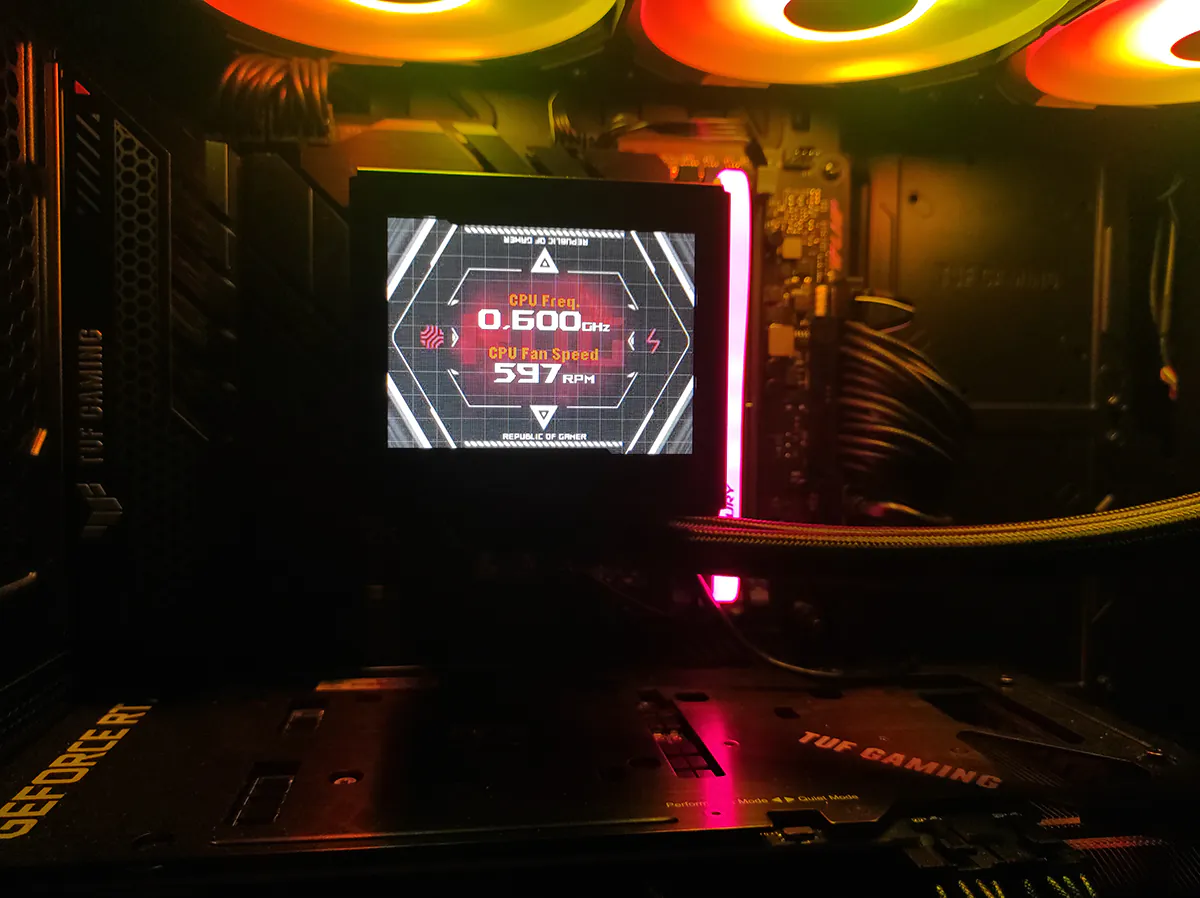© ROOT-NATION.com - Use of content is permitted with a backlink.
I am pleased to introduce you to the latest, most technologically advanced, most expensive and most tricky CPU water cooling system from ASUS – ROG RYUJIN III 360 ARGB. Recently I talked about its junior version – ROG RYUO III 360 ARGB. I highly recommend reading about it in this article. These ARGBs are similar to each other like two snowflakes – of the same genus and tribe, but with their own unique features. Still, the RYUJIN is the crowning achievement of the genius from ASUS. Here I will be comparing these systems with each other a lot so that you can decide whether to settle for the lower model or choose the top solution in the world of water cooling.
Read also: ASUS ROG Azoth Wireless Gamer Keyboard Review: Towards Customisation
Price and market positioning

The best water cooling costs $460, and that’s not the limit in the market. ASUS has competitors that cost more. No matter how you look at it, the RYUJIN III 360 will have to compete with more expensive cooling systems as well. A comparative analysis will definitely be below, and the RYUUO III 360 will be included there as well for clarity. Please note that the ASUS ROG RYUJIN III 360 ARGB is also available in white colour at a similar price.
Specifications
- Heat sink material: aluminium
- Substrate material: copper
- Sockets for AMD: AM4, AM5
- Sockets for Intel: LGA1150, LGA1155, LGA1156, LGA 1151, LGA 1200, LGA 1700
- Number of fans: 3
- Fan size: 120 mm
- Fan bearing type: hydrodynamic
- Maximum fan speeds: 2200 rpm
- Maximum fan airflow: 70 ft³/min
- Backlighting: Aura RGB
- Radiator size: 360 mm
- Pump size: 89×91×101 mm
- Pump speed: 3600 rpm
- Spigot length: 400 mm
- Noise level: 36 dB
Read also:
- ASUS ROG RYUO III 360 ARGB Water Cooler Review
- LAMAX Heroes General1 review: Gaming headset with ergonomic design and great sound
Package contents
The product is packaged in the best possible way. Just like the younger model, RYUJIN III 360 comes in a nice box, in which you will find a six-year warranty certificate. All cooling components are distributed in separate boxes. Everything is packed securely and conveniently, which is typical for ASUS.
And here’s the complete package. Now I’m going to see what’s interesting here.
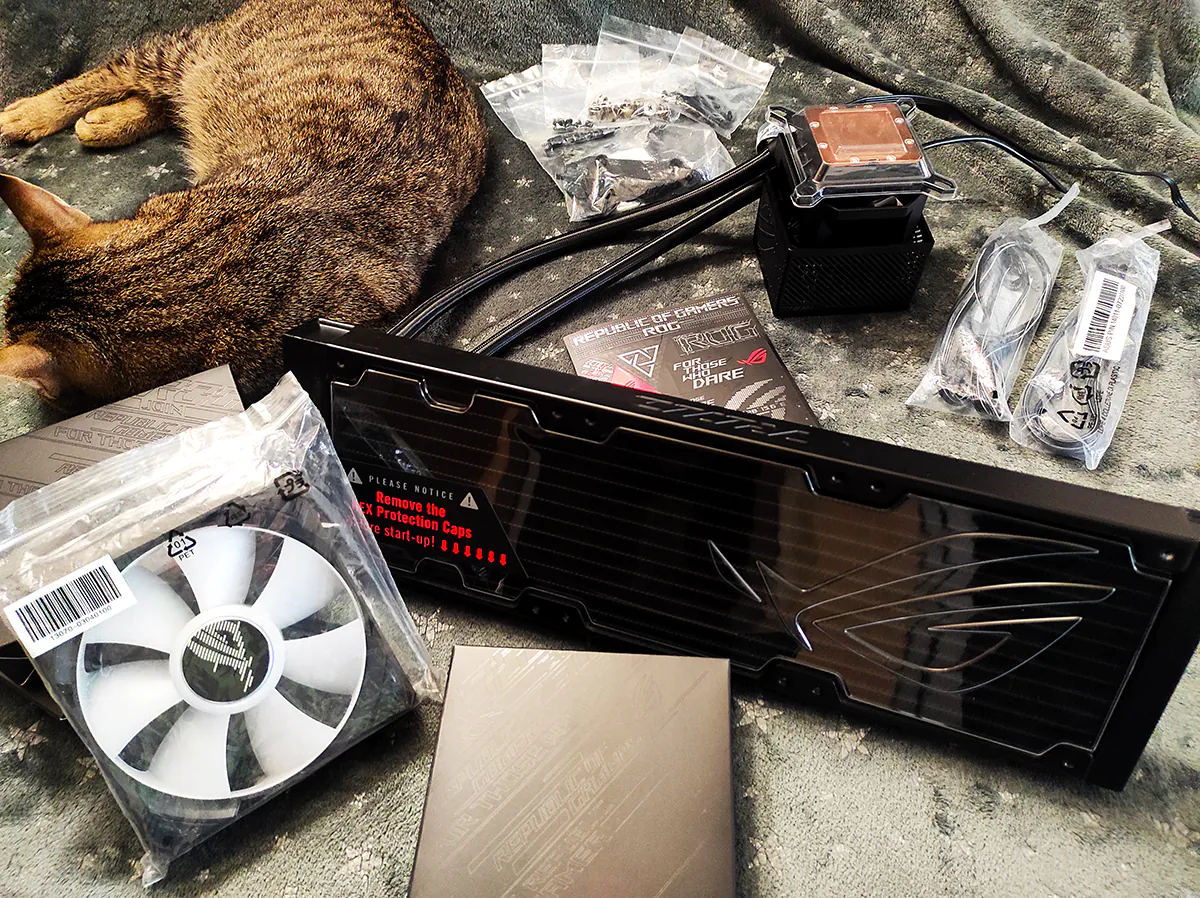
It didn’t take long for the surprises to arrive. Namely, fans without wires. Only connector blocks on the ends. And they are attached to each other with the help of magnets. It turns out that there will be only one cable from the cooler block instead of six. Fantastic! It is both beautiful and practical at the same time. Why six? A classic fan has one cable for power supply and the second one for illumination. The RYUJIN III 360 has a combined cable, magnetically attached. The backlight is, of course, the branded Aura RGB.
The surprises from the coolers don’t end there. To reduce vibrations, the mounting lugs are rubberised, just like the RYUO III 360. What RYUO didn’t have was a special shape of the blades themselves. Like in expensive graphics cards, the impeller is framed by a ring, similar to fans used in turbines. This shape is necessary for a more stable and directed air flow. Noise, by the way, is also reduced.
In the package with various fasteners you will find strips for Intel and AMD sockets, screws for attaching fans to the heatsink and heatsink to the case. A set of extensions and chrome-plated nuts for mounting the pump are included. All the necessary bolts and screws are in abundance. Very cool that the cooling supports mounting on multiple sockets. With some competitors, I won’t point fingers, a particular cooling model may be designed for only one socket. You want to move it? You have to buy a new cooling system. Categorically, ASUS, respect!
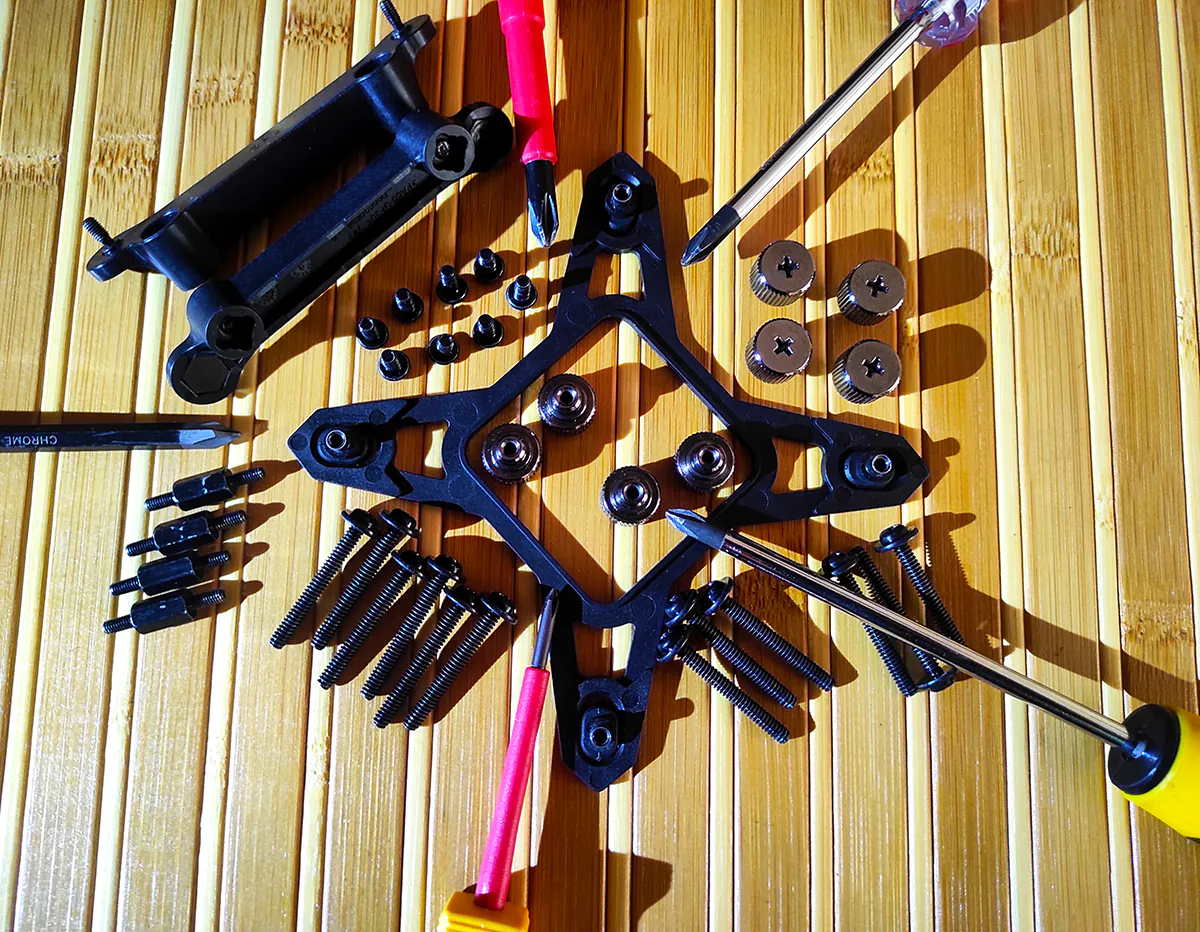
Lastly, I left an impressively sized radiator with a pump. The impressive dimensions are 360 mm length and 30 mm thickness. The heatsink cells are dense and neat. The ROG RYUO III 360 ARGB has a similar one, by the way.
I liked the design of the pump. It has a full-fledged display, which can be easily removed, exposing the heart in the form of a cooling turbine. Such a feature is useful during servicing of the SWO and for convenience of its mounting to the motherboard. I was also intrigued by the air ducts on the pump body. This is a very interesting feature of ROG RYUJIN III 360 ARGB, which I will tell you about later.
This is how the water cooling system looks assembled.
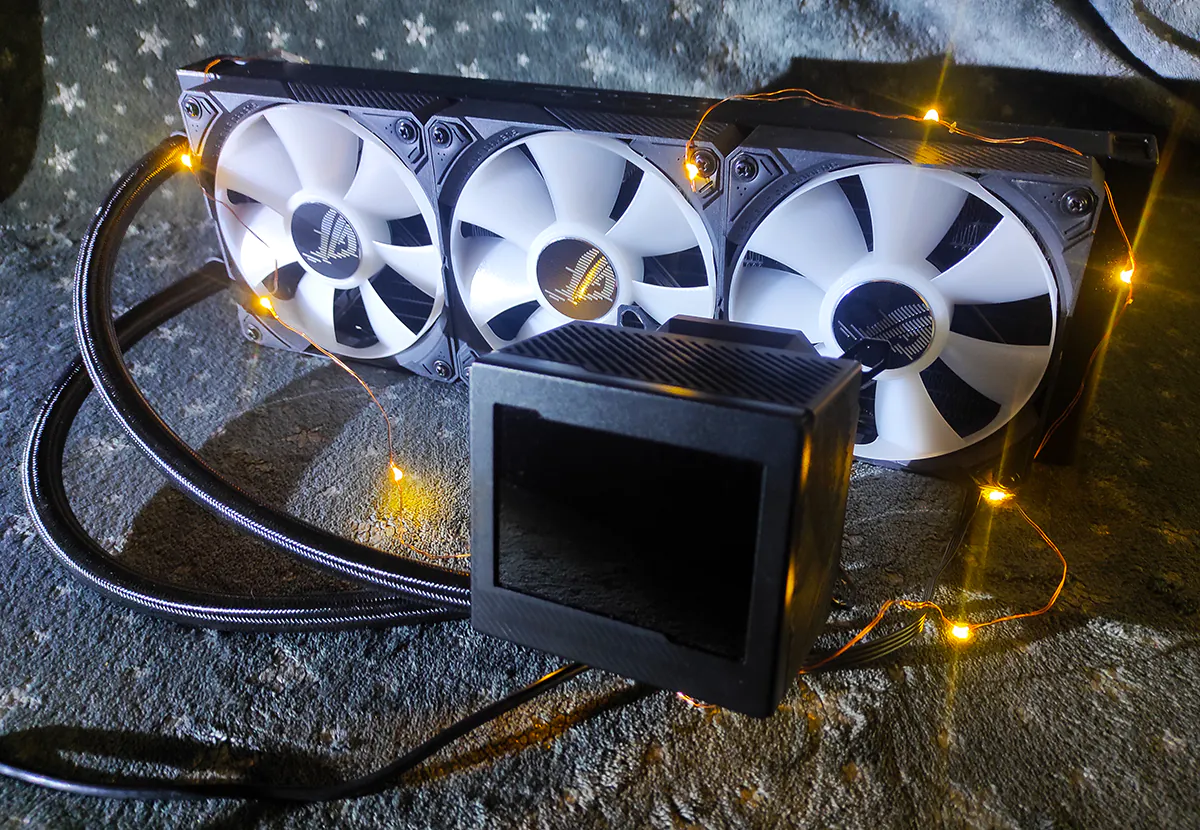
I always forget about the manual. It’s there, of course. As well as a set of branded stickers. A nice bonus – a Velcro organiser for wires.
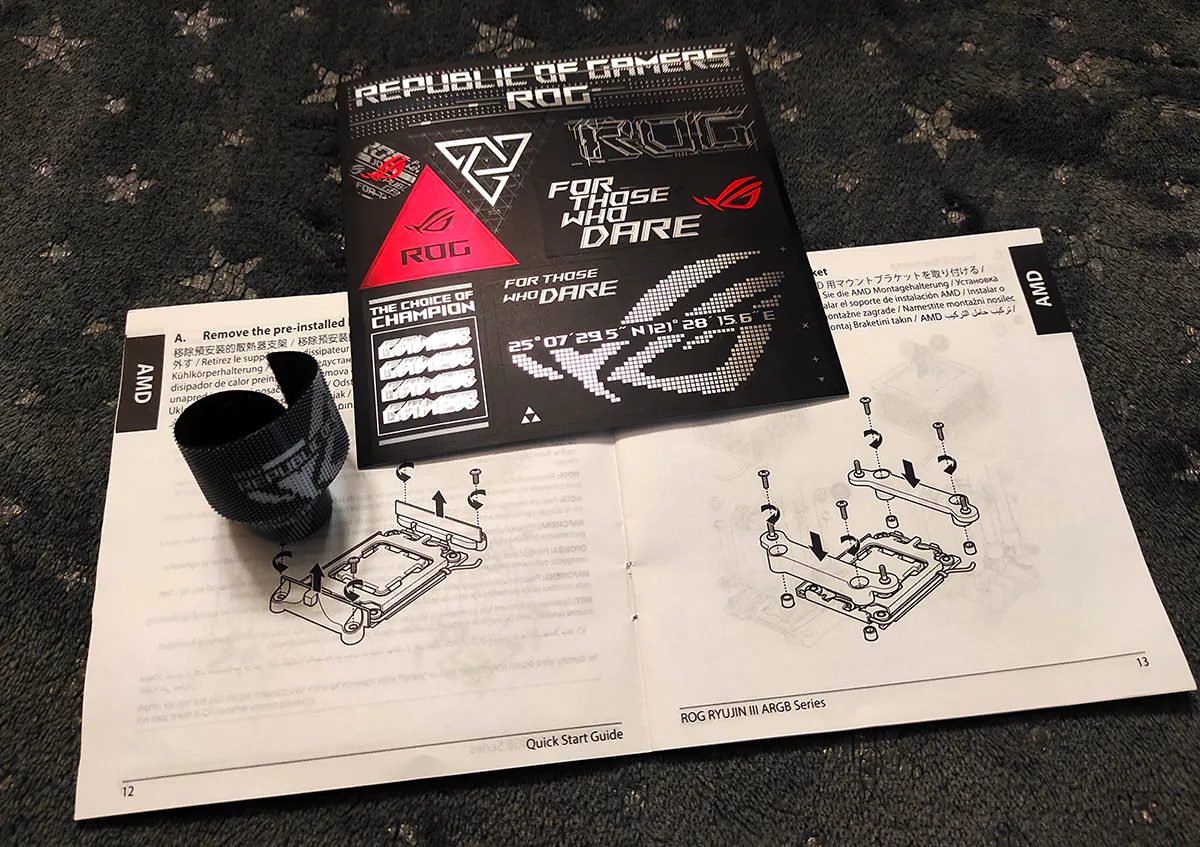
Main features
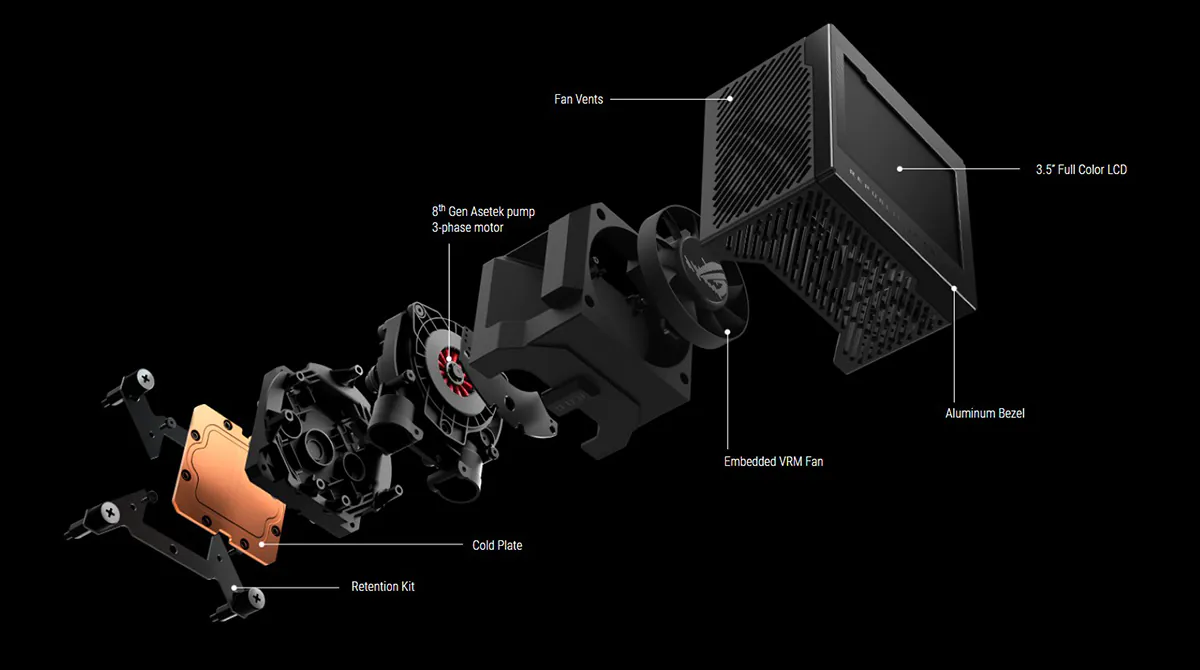
A bit earlier I started to tell you about the pump and ducts that interested me so much. So, they are needed for cooling the power supply phases on the motherboard. What other SWO can boast of such a solution? According to ASUS, this solution is able to reduce VRM temperature by 35°C. Otherwise, it’s the same innovative eighth-generation Asetek pump as in RYUO III 360, only with a 32% larger copper heat sink plate.
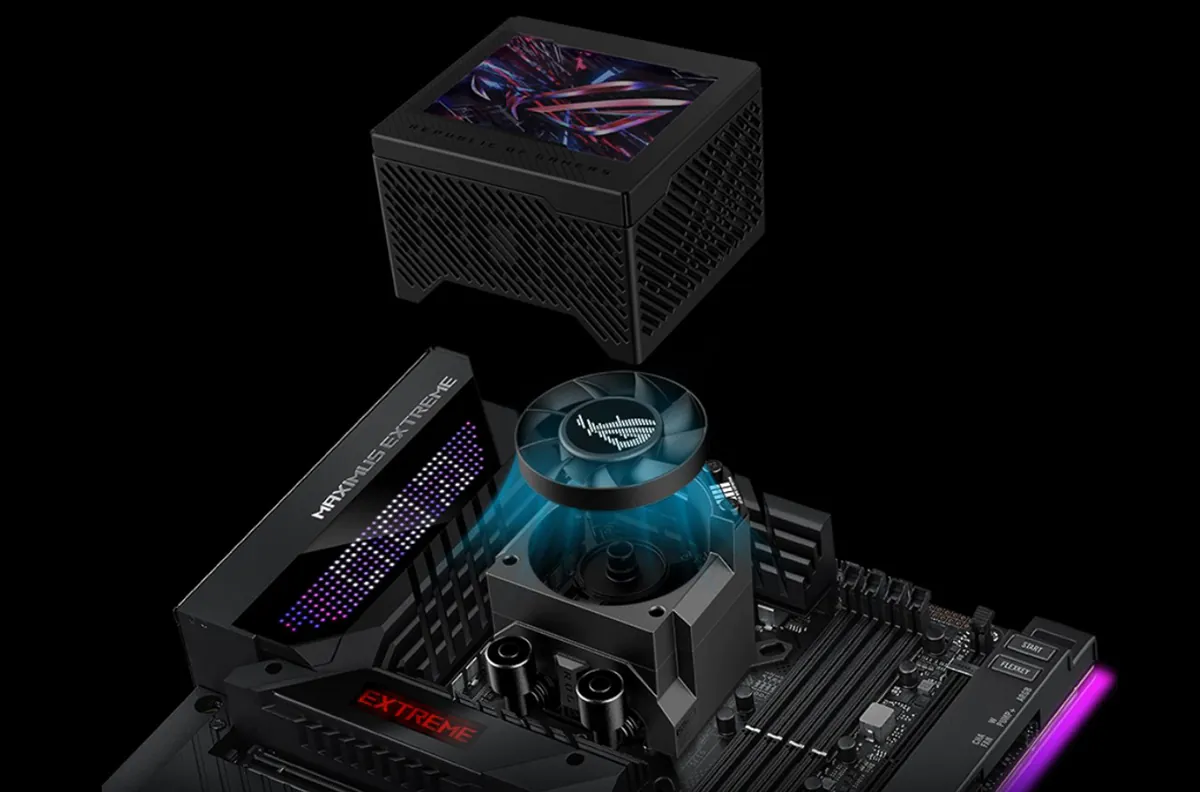
ROG Magnetic Daisy-chainable Magnetic Fans, which I have already told you a lot about. Let me just add that they are quiet – 36dB at 2200rpm. The airflow capacity is 70 ft³/min each.
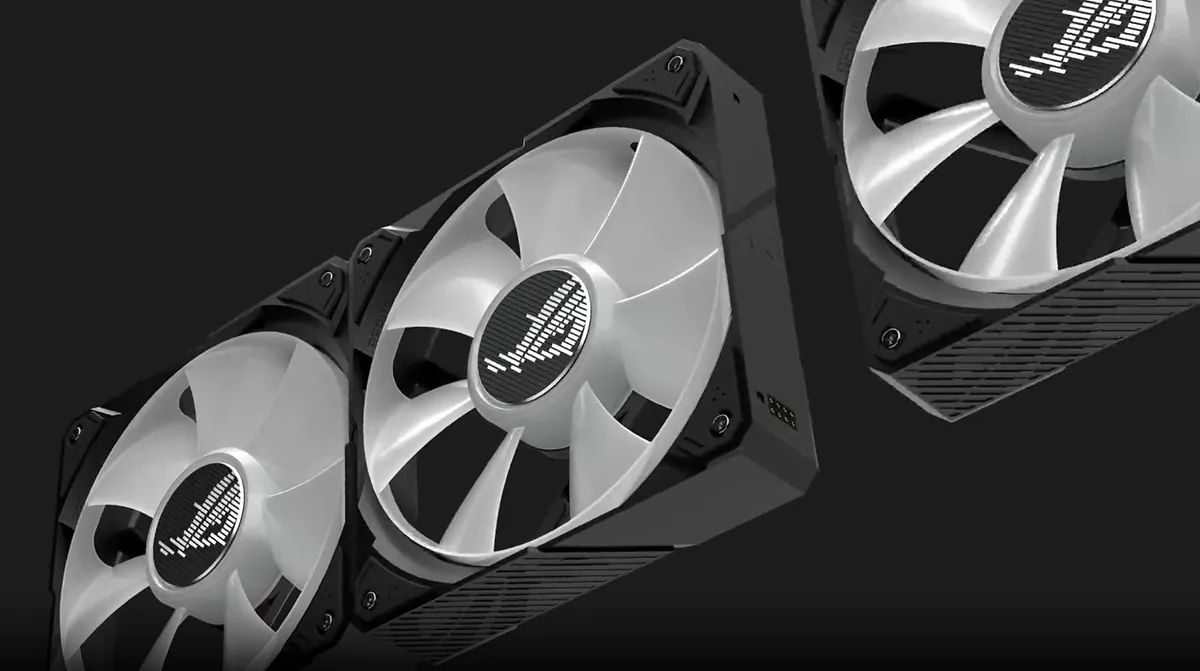
The coolant circulation pipes have been modernised. While their length remains unchanged at 400 mm, ASUS ROG RYUJIN III 360 has increased their inner diameter from 5 mm to 7 mm. This will definitely have a positive impact on cooling efficiency.
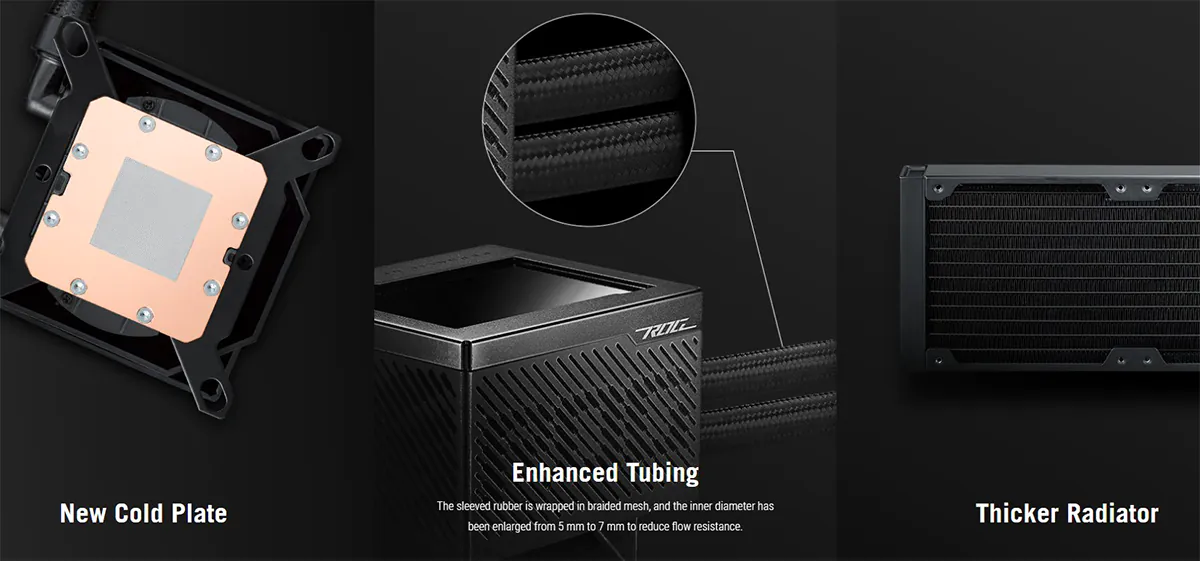 The RYUJIN III 360 has a real 3.5″ LCD panel. Its quality is as good as average monitors – 60 Hz with 24-bit colour reproduction. On the screen you can display parameters of accessories status, various images or animated screensavers. Integration with AIDA64 software allows displaying all kinds of widgets with temperature, frequency, FPS and other necessary values on the panel.
The RYUJIN III 360 has a real 3.5″ LCD panel. Its quality is as good as average monitors – 60 Hz with 24-bit colour reproduction. On the screen you can display parameters of accessories status, various images or animated screensavers. Integration with AIDA64 software allows displaying all kinds of widgets with temperature, frequency, FPS and other necessary values on the panel.
Read also: Razer Cobra Pro gaming mouse review: comfort, charm and uniqueness
Utility
The ROG RYUJIN III 360 ARGB is controlled and customised in the Armoury Crate app. The Fan Expert 4 tab has all the possible sliders and switches to adjust the fans and pump. I won’t be unsubstantiated, in my review of the RYUO III 360 I went into detail about the features and nuances of temperature settings. So just leaving you a link to this article.

ROG RYUJIN III menu deserves a fuller description, it opens the settings of the pump screen. And the first option of its use is the animation display mode. Several options are available by default, but the most interesting is the possibility to run your own video in GIF format on the display.
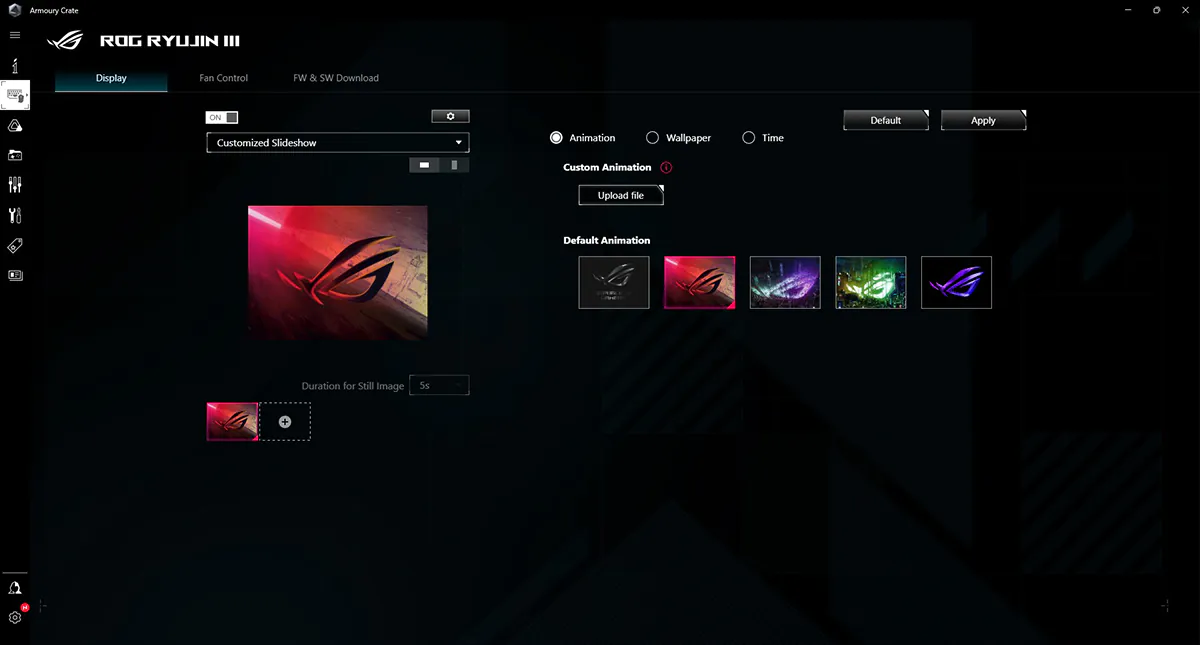
Similar in meaning is the image output mode called “Wallpaper”. In addition to the preset ones, you can upload your own JPG photos. You can decorate the pictures by adding your own text to them.

The option to display the current time is also available in the settings. Useful and practical, but I would add here the possibility to customise the image and font.

Pictures, animations and time output can be combined in a slideshow. In any order you like, but there is a limit of five images.

The most useful use case of the built-in monitor is the output of current hardware readings. It is called “Hardware Monitoring”. Temperature, voltage, cooler speed and frequency are available on the screen. You can monitor both the processor, motherboard or video card. In total, up to three different parameters can be displayed on the panel. By combining a variety of data screens and being able to create a slideshow, up to 15 different component readings can be displayed. The background and fonts on the screen can be easily customised according to pre-defined themes or in user mode.

If for some reason you are unable to install the pom pom the right way, don’t worry. The ROG RYUJIN III menu has a setting that allows you to set the screen orientation to portrait or landscape. So much for consumer care.
Like the RYUO, the RYUJIN has a standby setting where you can choose what animation will be displayed on the screen when the PC is switched off. The brightness of the panel is also set here. The “Temperature Warning” function allows you to configure an alert to be played on the display when the processor temperature reaches a critical level.

Scope of application
I am sure that a top-end cooling system must be able to cope with any modern CPU, both stock and overclocked. If it won’t provide quality heat removal from the stone, then what will? ASUS doesn’t have a more expensive and productive system. Once again I’ll draw your attention to the review of ROG RYUO III 360, where I tried to tell you in detail about the rationality of using an air-conditioning system in certain cases.
For now, I’ll just give you a brief summary of how to choose the ideal cooling system. So, the amount of heat, in watts (TDP), that the cooling can dissipate should be 40% more than the amount of heat that the processor generates. The ASUS ROG ROG RYUJIN III 360 has a TDP of 450 watts, which is 100 watts more than the RYUO III. In the table I have given data for the most modern CPUs and how the RYUJIN will cope with their cooling. Here I have also included the data for RYUO for clarity and comparison.

Comparison with competitors
The best ASUS WAN should be compared only with the best WANs of other manufacturers. The cost should not be decisive, because both of them are TOP. There is simply no better quality. In the following comparison table I’m again including data for RYUO to see how far it lags behind the most advanced models.

Testing
To maintain the maximum repeatability of the ROG RYUJIN III 360 test, you must reproduce it under the same conditions as the ROG RYUO III 360. For what purpose? For comparison, of course. Therefore, I will use the same Intel Core i5-13600 processor, in the same case – ASUS TUF Gaming GT502. The method is similar. To begin with, I get a starting CPU temperature of 26°C after one hour of idle time.

Further – a half-hour stress test in AIDA64 heated up the processor to 48°C, which is 22°C more than the base temperature.

In the comparative table below, I provide data on the effectiveness of RYUJIN and RYUO.
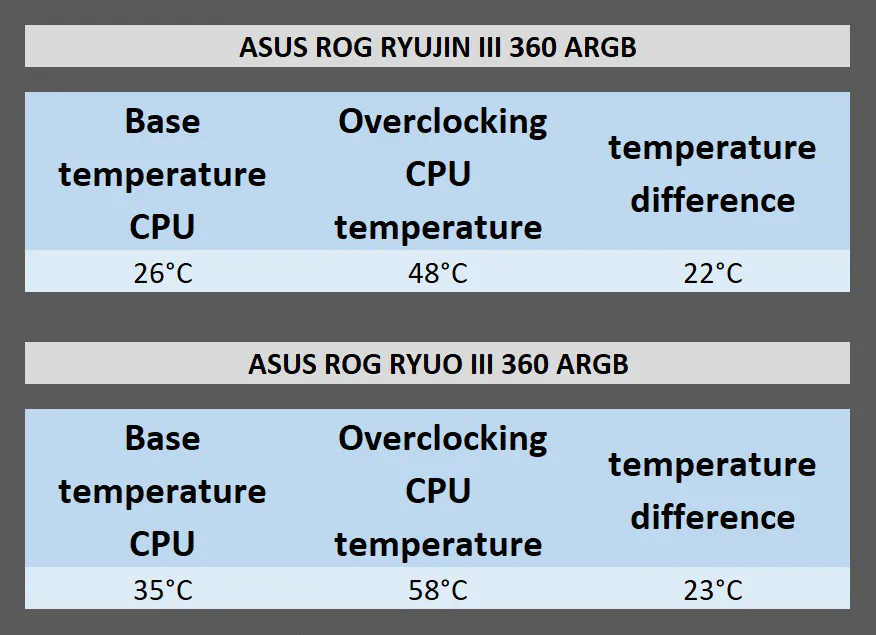
Read also: Hator Aria Wireless Portable Speaker Review
Summary
I consider the main question whether ASUS ROG RYUJIN III 360 ARGB is worth its money to be closed. The answer is unequivocally yes! The cooling system copes with all the existing processors. Convenient, beautiful and technological water cooling system and among competitors feels at the height. The difference with ASUS ROG RYOU III 360 ARGB is not colossal, but tangible, and exactly covered by $120 overpayment. Among the disadvantages, or rather, even remarks, I’ll note the following. The SWO can hardly cope with some overclocked Intel processors. I believe that the ROG III 360 lineup should logically end with another, more productive model. Looking forward to the announcement!
Read also:



